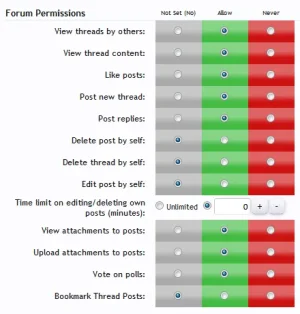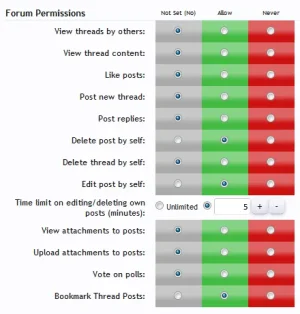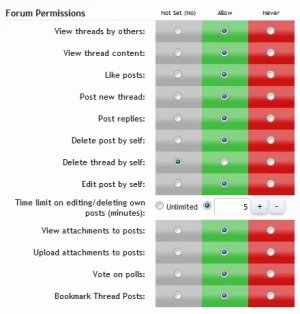Set the node as Private.
Explicitly allow access (View Node: Allow) to the groups you wish.
That's it.
And I view it, but nothing else. I cant create any thread in that private node.
Any advice ?
Set the node as Private.
Explicitly allow access (View Node: Allow) to the groups you wish.
That's it.
Make sure you have "Allow new messages to be posted in this forum" and if you set it to private, make sure that under that specific forum you set permission for the specific user to allow them to post on there.
Under the forum permission you should see a box where you can type the username and sit it's permission. This is how I got mine to work!
Well this is very confusing. I am trying to create a private forum for admin and supermoderators, just that.
I create the node.
I set it to private.
In groups below "private" I set admin everything to green and its not working, just see the forum, but without being able to post.
Everything gray and create threads in green, not working, everything green and publish to yellow, not working...
So I am an admin who creates a private forum that cant post in it.
Can someone explain why not a single combination works ?
Thanks.
There must be a "Never" permission somewhere. "Never" permissions are overriding. Check the permissions for your other usergroups.
Also make sure this is enabled for that forum:
Admin CP -> Applications -> Display Node Tree -> [click the forum] -> Forum Options: Allow new messages to be posted in this forum



Indeed, I know I'm one of them. The permission system in XF appears to be the most complex out of any other forum system I've used (about a dozen or so). I'm not sure why it has to be so seemingly complex and convoluted. It is the one thing I dislike about XF (and in fact, it is what I consider to be XF's one fundamental flaw and weakness when compared to its competitors) and is the reason why I've delayed moving my community with 45 forums, several private user groups, and several private forums over to XF. I wish it was a more traditional system, and I'm not sure why it uses the setup that it currently does. It just seems counterintuitive (given the logical structure of traditional forum permissions in other systems).Having logged in to quite a few installations to resolve permission issues, it's clear that a lot of people haven't quite grasped the concept.
Indeed, I know I'm one of them. The permission system in XF appears to be the most complex out of any other forum system I've used (about a dozen or so).
You disagree that it is the most complex out of any other forum software I've personally used?I disagree, but do acknowledge it's different than other systems.
Can you expand on that?It allows any number of private forums in any combination without complicated mutliple groups for every eventuality.
But wouldn't I have to create a new usergroup for each possible combination?
Creating a private forum
Because of the way Revoke works in xenForo you shouldn't use it to restrict a private forum. Instead you should use a special feature in xenForo called Private node. You will see the Private node checkbox when editing the permissions for a specific node. This basically inverts the permissions so that you can specify Allowed groups instead of Revoked groups. This is actually better for group management if you add more groups later.
Admin CP -> Users -> Node Permissions -> [select a forum] -> Private node
We use essential cookies to make this site work, and optional cookies to enhance your experience.